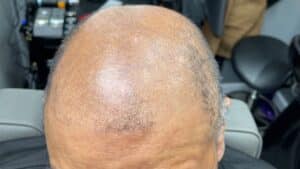Hair loss is a common problem among many individuals today. Some causes may include underlying medical conditions, dietary changes, or environmental conditions. One way to manage this condition is a hair transplant or micropigmentation.
Both procedures have their advantages and risk factors. Read on to understand them in detail and make the right decision.
What Is a Hair Transplant?
A hair transplant is one of the ways to treat baldness. The procedure involves removing hair from thicker parts of the scalp and attaching it to places with baldness or thinning.
The process creates a more natural-looking head of hair.
Scabbing and infection are this hair transplant process’s risks and potential side effects.
What Is Scalp Micropigmentation and How Does It Work?
Scalp micropigmentation is a relative way to treat hair loss.
The micropigmentation artist will inject tiny amounts of pigment into the scalp. This will create the illusion of thicker, fuller hair.
This procedure is also called “hair tattooing.” The method offers a long-lasting solution for those struggling with thinning or baldness.
The artist carefully selects the pigments. They should match the natural hair color to give a natural-looking head of hair. The results of this micropigmentation treatment can last anywhere from 6 months to 3 years. The effect depends on how well it was administered and how quickly the body absorbs the pigment.
Factors That Differ Between Hair Transplant and Micropigmentation
When considering whether to undergo a hair transplant or scalp micropigmentation, it’s essential to understand the key factors that separate these two treatments.
1) Cost
Hair transplants are often more expensive than scalp micropigmentation due to the complexity of the procedure. A hair transplant requires specialized equipment and expertise, making it significantly more costly than scalp micropigmentation.
During scalp micropigmentation, small amounts of pigments are injected into the scalp. These will create a look of fuller and thicker hair. This method is faster compared to hair transplantation. Also, it is done easier and in a cost-effective manner.
2) Recovery
Hair transplants can take longer to recover from than scalp micropigmentation. With hair transplantation, there is typically a waiting period after the procedure before new hairs start to appear. Depending on the individual’s healing rate, this can take several weeks or months. Scalp micropigmentation has no recovery time, and results are visible immediately.
3) Results
Hair transplants can provide more natural-looking results than scalp micropigmentation. Hair transplants use existing hair follicles to create a more realistic look, while scalp micropigmentation relies on pigment to create the appearance of hair.
4) Maintenance
Hair transplants require no maintenance, whereas scalp micropigmentation does. Scalp micropigmentation will fade over time and may need to be touched every few years to maintain the desired results.
Some tips for maintaining SMP include:
a) Using sunscreen with an SPF of at least 30
b) Avoiding vigorous scrubbing or swimming in chlorinated pools
c) Refraining from picking at the area
d) Keeping the scalp clean and moisturized
Call New Man SMP for the best scalp micropigmentation for men in Atlanta. We proudly offer the latest scalp micropigmentation treatments to ensure our clients get the best, most natural-looking results.








